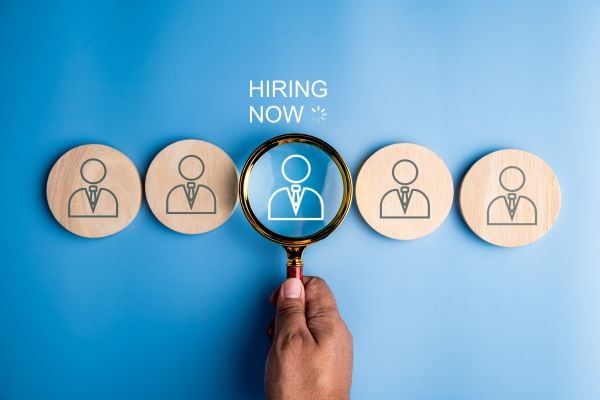The potential impact of AI on society is far-reaching. You’ve likely felt the impact in one way or another in your life. Perhaps the biggest opportunity or threat to you, depending on your career path, is your job.

There has been significant chatter within Executive search circles about how AI has and could further potentially disrupt jobs across most industries. Some industries and professions have more to worry about than others.
To cut through the speculation, I dug into some research and found an interesting analysis by Bloomberry about the jobs that are being replaced by AI. Below, I’ll discuss:
- Why jobs have become more vulnerable to AI
- The jobs that are most vulnerable to AI according to Bloomberry data
- Jobs that have been deemed safe from AI (for now)
Why Are Jobs More Vulnerable To AI?
AI offers a lot of potential benefits to companies, particularly in the areas of efficiency. Greater efficiency can simplify processes and help reduce overall operating costs. Here are the key reasons why jobs have become more vulnerable to artificial intelligence:
- Automation: AI can automate repetitive and routine tasks more efficiently than humans.
- Advancements in AI technology: AI technologies are becoming increasingly sophisticated. They are now capable of performing complex tasks that were previously thought to be exclusive to humans. This expansion of AI capabilities threatens jobs across various industries.
- Cost efficiency: Using AI can often be more cost-effective for businesses compared to humans. Once the initial investment is recuperated, the ongoing costs are often lower than employing people.
- Scalability: AI systems can work around the clock without needing breaks, vacations, or sick leave. They can also scale up or down depending on demand, providing businesses with flexibility and consistency in operations.
- Data-driven decision-making: AI can analyze vast amounts of data quickly and accurately, enabling organizations to make data-driven decisions with greater precision. This can lead to increased efficiency and productivity.
As you can see in the list above, there are many potential advances in leveraging AI. This poses a risk to workers. But what types of jobs are at the greatest risk?
What Jobs Are Most Vulnerable to AI?
Is your job vulnerable to AI? The odds are higher if you work in a tech, analytics, or creative roles. In particular, AI poses a big threat to the self-employed and freelance community, according to Bloomberry.
Researchers looked at the 12 most popular job categories in Upwork to see what roles had an increase or decrease in the number of jobs since ChatGPT was released. The vast majority of jobs increase, except for 3 categories – writing, translation, and customer service:
- Writing jobs declined 33%
- Translation jobs declined 19%
- Customer service jobs declined by 16%
When looking at this data, I can see how this makes sense. These jobs are, on the surface, easier to automate. Writing and content development is far and away the biggest use for AI tools. The increase in the use of chatbots for customer service also gives credence to why customer service jobs would drop.
“This is hardly the biggest shock, as some of the earliest and most developed use cases for AI are basic copywriting tasks and customer service chatbots. Swedish buy-now-pay-later startup Klarna just announced that its customer service chatbot is doing the work of 700 customer service reps, for instance, and the media has been full of stories of writers who have lost their jobs to AI replacements,” says Jessica Stillman from inc.com.
One thing that I thought was surprising is the lack of impact AI tools had on programming, software, and graphic design.
“Web design, graphics design, software development and video production jobs have been the most resilient and have not seen any drop in demand (and even an increase),” says Bloomberry.
This could be a result of AI not being good enough (yet) to replicate what people can do. But once people learn how to use these tools more effectively, and as they get better, this could change.
There Is A Glimmer Of Hope From Those Most Vulnerable
Now that ChatGPT and other AI tools have been out for a while and people have had the chance to use them, their shortcomings are starting to surface. There has been some pushback in terms of the quality and accuracy of the content AI tools produce. So, there is hope for writers and translators.
For example, the March Google search algorithm update has specifically targeted low-quality AI content producers. So, companies cannot simply create mass amounts of AI content and expect to have a strong visibility online.
AI tools are great at offering quantity over quality. You can produce a lot of basic information, but it lacks the one element that great copy possesses – personalization. The same can be said for customer service. AI is not yet at the stage where it can fully replace the human element.
AI can assist with human tasks, but it still requires a human to oversee AI outputs. So, look for writers, translators and other creatives to shift into more content development and editorial roles. They can allow AI to create the base content and support the creative process, but humans will edit and put the final human touch on it.
What Industries Are At Risk Of Losing Jobs To AI?
AI has far-reaching effects. There are a lot of different industries that will be affected by AI in the coming years. Some of the industries expected to be impacted the most include:
- Sales
- Digital Marketing
- Customer service
- Food services
- Transportation
- Warehousing
- Manufacturing
How Many Jobs Will AI Replace By 2030?
According to a McKinsey report, AI is expected to replace 2.4 million US jobs by 2030. This will include an additional 12 million occupational shifts. Jobs with repetitive tasks are the most vulnerable. This includes data entry clerks, telemarketers, cashiers, and customer service representatives. Many other roles can expect to see a significant shift in the type of work they perform.
A Final Word About The Impact Of Artificial Intelligence on Jobs
Artificial intelligence is impacting jobs and it will continue to do so in the future. How much it will impact your job will depend on your industry. Your ability to learn AI skills and understand how it impacts your career can help you future-proof your position.
More From Our Toronto Executive Search Team About The Impact of AI On Jobs
How to Avoid Falling Victim to AI Recruiter Scams in 2024





